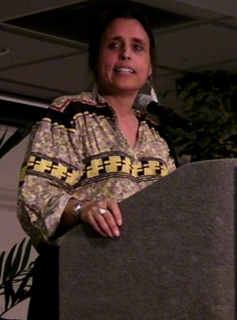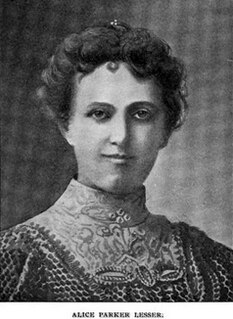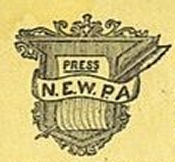Related Research Articles

Winona LaDuke is an American environmentalist, economist, writer and industrial hemp grower, known for her work on tribal land claims and preservation, as well as sustainable development.

Beverly is a city in Essex County, Massachusetts, and a suburb of Boston. The population for 2020 is 42,936. A resort, residential, and manufacturing community on the Massachusetts North Shore, Beverly includes Ryal Side, Beverly Farms and Prides Crossing. Beverly is a rival of Marblehead for the title of being the birthplace of the U.S. Navy.

The National Association of Colored Women's Clubs (NACWC) is an American organization that was formed in July 1896 at the First Annual Convention of the National Federation of Afro-American Women in Washington, D.C., United States, by a merger of the National Federation of African-American Women, the Woman's Era Club of Boston, and the Colored Women’s League of Washington, DC, at the call of Josephine St. Pierre Ruffin. From 1896 to 1904 it was known as the National Association of Colored Women (NACW). It adopted the motto "Lifting as we climb", to demonstrate to "an ignorant and suspicious world that our aims and interests are identical with those of all good aspiring women." When incorporated in 1904, NACW became known as the National Association of Colored Women's Clubs (NACWC).
Josephine St. Pierre Ruffin was an African-American publisher, journalist, civil rights leader, suffragist, and editor of the Woman's Era, the first national newspaper published by and for African-American women.

The President's Commission on the Status of Women (PCSW) was established to advise the President of the United States on issues concerning the status of women. It was created by John F. Kennedy's Executive Order 10980 signed December 14, 1961.

Colby–Sawyer College is a private baccalaureate college in New London, New Hampshire. It was founded as a coeducational academy in 1837 and sits on a 200-acre (0.81 km2) campus.

The General Federation of Women's Clubs (GFWC), founded in 1890 during the Progressive Movement, is a federation of over 3,000 women's clubs in the United States which promote civic improvements through volunteer service. Many of its activities and service projects are done independently by local clubs through their communities or GFWC's national partnerships. GFWC maintains nearly 70,000 members throughout the United States and internationally. GFWC remains one of the world's largest and oldest nonpartisan, nondenominational, women's volunteer service organizations. The GFWC headquarters is located in Washington, D.C.

Business and Professional Women's Foundation (BPW) is an organization that promotes workforce development programs and workplace policies to acknowledge the needs of working women, communities and businesses. It supports the National Federation of Business and Professional Women's Clubs.
Jacqueline Hansen is a former long-distance runner from the United States who is recognized by the International Association of Athletics Federations as having set a world best in the marathon on two occasions.

Helen C. White was a professor of English at the University of Wisconsin–Madison. White twice served as the English department chair and was the first woman to become a full professor in the university's College of Letters and Science. She was also the first woman elected president of the American Association of University Professors, and a president of the American Association of University Women (AAUW), University of Wisconsin Teachers' Union, and University Club. White wrote six novels and numerous nonfiction books and articles.

Abbie "Gail" Hill Laughlin was an American lawyer, suffragist, an expert for the United States Industrial commission, and a member of the Maine State Senate. She was the first woman from Maine to practice law. She was the National Vice Chairman of the women’s suffrage movement and the President of the National Federation of Business and Professional Women’s Clubs. She was posthumously inducted into the Maine Women's Hall of Fame in 1991.
The First National Conference of the Colored Women of America was a three-day conference in Boston organized by Josephine St. Pierre Ruffin, a civil rights leader and suffragist. In August 1895, representatives from 42 African-American women's clubs from 14 states convened at Berkeley Hall for the purpose of creating a national organization. It was the first event of its kind in the United States.

Alice Parker Lesser was an American lawyer, suffragist, and clubwoman based in Boston, Massachusetts.

The New England Woman's Press Association (NEWPA) was founded by six Boston newspaper women in 1885 and incorporated in 1890. By the turn of the century it had over 150 members. NEWPA sought not only to bring female colleagues together and further their careers in a male-dominated field, but to use the power of the press for the good of society. The group raised funds for charity and supported women's suffrage and other political causes.
The Woman's Era Club was an African-American women's civic organization founded in Boston, Massachusetts, in between 1892 and 1894 by Josephine St. Pierre Ruffin. The Club was the first black women's club in Boston. The organization was especially well-known for the conflict caused when Ruffin attempted to desegregate the General Federation of Women's Clubs (GFWC) in 1900.

Cora Louise Boehringer was the first female superintendent of schools in Yuma County, Arizona and the first woman to be elected to office in the state. She has been called "the mother of the Arizona educational system". In 2008 she was inducted into the Arizona Women's Hall of Fame.
Jane Brunson Marks was active in civic work.

Fannie Jean Black was the president of the San Francisco California Club from 1910 to 1912 and the chairman for San Francisco County on Woman's Auxiliary Board for the Panama–Pacific International Exposition in 1915.
Gertrude Bent Wilder was the president of the San Bernardino County Federation of Women's Clubs.

Annie Land O'Berry (1885–1944) was an activist, relief worker, and philanthropist from North Carolina. O'Berry was a native to North Carolina, growing up in Edgecombe County on a farm with her family. She was involved in women's clubs and an open member of the Democratic party. More specifically, O’Berry's endeavors in the North Carolina Emergency Relief Association, North Carolina Democratic Party, League of Women Voters, and the Women's Missionary Society at her local Presbyterian Church demonstrated her dedication to serving her community. As an academic, O'Berry was named the first honor graduate from Peace University.
References
- 1 2 3 4 5 6 7 8 Binheim, Max; Elvin, Charles A (1928). Women of the West; a series of biographical sketches of living eminent women in the eleven western states of the United States of America. p. 233 . Retrieved 8 August 2017.CS1 maint: discouraged parameter (link)
 This article incorporates text from this source, which is in the public domain.
This article incorporates text from this source, which is in the public domain.